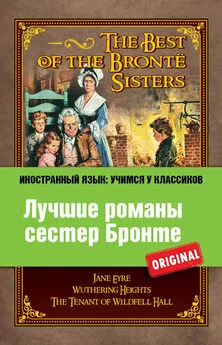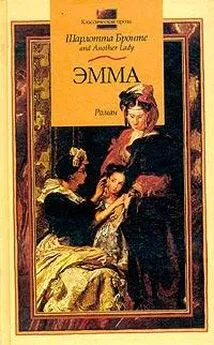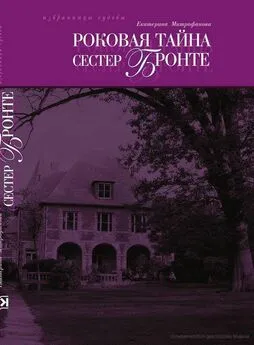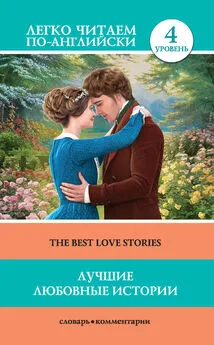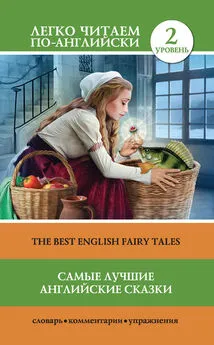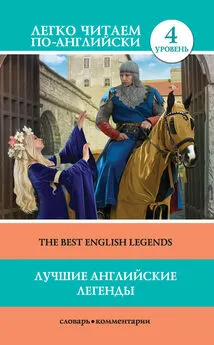Шарлотта Бронте - Лучшие романы сестер Бронте / The best of the Brontë sisters
- Название:Лучшие романы сестер Бронте / The best of the Brontë sisters
- Автор:
- Жанр:
- Издательство:Литагент «Эксмо»334eb225-f845-102a-9d2a-1f07c3bd69d8
- Год:2013
- Город:Москва
- ISBN:978-5-699-61892-7
- Рейтинг:
- Избранное:Добавить в избранное
-
Отзывы:
-
Ваша оценка:
Шарлотта Бронте - Лучшие романы сестер Бронте / The best of the Brontë sisters краткое содержание
«Иностранный язык: учимся у классиков» – это только оригинальные тексты лучших произведений мировой литературы. Эти книги станут эффективным и увлекательным пособием для изучающих иностранный язык на хорошем «продолжающем» и «продвинутом» уровне. Они помогут эффективно расширить словарный запас, подскажут, где и как правильно употреблять устойчивые выражения и грамматические конструкции, просто подарят радость от чтения. В конце книги дана краткая информация о культуроведческих, страноведческих, исторических и географических реалиях описываемого периода, которая поможет лучше ориентироваться в тексте произведения.
Серия «Иностранный язык: учимся у классиков» адресована широкому кругу читателей, хорошо владеющих английским языком и стремящихся к его совершенствованию.
Лучшие романы сестер Бронте / The best of the Brontë sisters - читать онлайн бесплатно ознакомительный отрывок
Интервал:
Закладка:
‘By no means!’ replied the oracle, with a Jove-like nod; ‘these things are all blessings and mercies, if we only knew how to make use of them.’
‘But Mrs. Graham doesn’t think so. You shall just hear now what she told us the other day – I told her I’d tell you.’
And my mother favoured the company with a particular account of that lady’s mistaken ideas and conduct regarding the matter in hand, concluding with, ‘Now, don’t you think it is wrong?’
‘Wrong!’ repeated the vicar, with more than common solemnity – ‘criminal, I should say – criminal! Not only is it making a fool of the boy, but it is despising the gifts of Providence, and teaching him to trample them under his feet.’
He then entered more fully into the question, and explained at large the folly and impiety of such a proceeding. My mother heard him with profoundest reverence; and even Mrs. Wilson vouchsafed to rest her tongue for a moment, and listen in silence, while she complacently sipped her gin-and-water. Mr. Lawrence sat with his elbow on the table, carelessly playing with his half-empty wine-glass, and covertly smiling to himself.
‘But don’t you think, Mr. Millward,’ suggested he, when at length that gentleman paused in his discourse, ‘that when a child may be naturally prone to intemperance – by the fault of its parents or ancestors, for instance – some precautions are advisable?’ (Now it was generally believed that Mr. Lawrence’s father had shortened his days by intemperance.)
‘Some precautions, it may be; but temperance, sir, is one thing, and abstinence another.’
‘But I have heard that, with some persons, temperance – that is, moderation – is almost impossible; and if abstinence be an evil (which some have doubted), no one will deny that excess is a greater. Some parents have entirely prohibited their children from tasting intoxicating liquors; but a parent’s authority cannot last for ever; children are naturally prone to hanker after forbidden things; and a child, in such a case, would be likely to have a strong curiosity to taste, and try the effect of what has been so lauded and enjoyed by others, so strictly forbidden to himself – which curiosity would generally be gratified on the first convenient opportunity; and the restraint once broken, serious consequences might ensue. I don’t pretend to be a judge of such matters, but it seems to me, that this plan of Mrs. Graham’s, as you describe it, Mrs. Markham, extraordinary as it may be, is not without its advantages; for here you see the child is delivered at once from temptation; he has no secret curiosity, no hankering desire; he is as well acquainted with the tempting liquors as he ever wishes to be; and is thoroughly disgusted with them, without having suffered from their effects.’
‘And is that right, sir? Have I not proven to you how wrong it is – how contrary to Scripture and to reason, to teach a child to look with contempt and disgust upon the blessings of Providence, instead of to use them aright?’
‘You may consider laudanum a blessing of Providence, sir,’ replied Mr. Lawrence, smiling; ‘and yet, you will allow that most of us had better abstain from it, even in moderation; but,’ added he, ‘I would not desire you to follow out my simile too closely – in witness whereof I finish my glass.’
‘And take another, I hope, Mr. Lawrence,’ said my mother, pushing the bottle towards him.
He politely declined, and pushing his chair a little away from the table, leant back towards me – I was seated a trifle behind, on the sofa beside Eliza Millward – and carelessly asked me if I knew Mrs. Graham.
‘I have met her once or twice,’ I replied.
‘What do you think of her?’
‘I cannot say that I like her much. She is handsome – or rather I should say distinguished and interesting – in her appearance, but by no means amiable – a woman liable to take strong prejudices, I should fancy, and stick to them through thick and thin, twisting everything into conformity with her own preconceived opinions – too hard, too sharp, too bitter for my taste.’
He made no reply, but looked down and bit his lip, and shortly after rose and sauntered up to Miss Wilson, as much repelled by me, I fancy, as attracted by her. I scarcely noticed it at the time, but afterwards I was led to recall this and other trifling facts, of a similar nature, to my remembrance, when – but I must not anticipate.
We wound up the evening with dancing – our worthy pastor thinking it no scandal to be present on the occasion, though one of the village musicians was engaged to direct our evolutions with his violin. But Mary Millward obstinately refused to join us; and so did Richard Wilson, though my mother earnestly entreated him to do so, and even offered to be his partner.
We managed very well without them, however. With a single set of quadrilles, and several country dances, we carried it on to a pretty late hour; and at length, having called upon our musician to strike up a waltz, I was just about to whirl Eliza round in that delightful dance, accompanied by Lawrence and Jane Wilson, and Fergus and Rose, when Mr. Millward interposed with: – ‘No, no; I don’t allow that! Come, it’s time to be going now.’
‘Oh, no, papa!’ pleaded Eliza.
‘High time, my girl – high time! Moderation in all things, remember! That’s the plan – “Let your moderation be known unto all men!”’
But in revenge I followed Eliza into the dimly-lighted passage, where, under pretence of helping her on with her shawl, I fear I must plead guilty to snatching a kiss behind her father’s back, while he was enveloping his throat and chin in the folds of a mighty comforter. But alas! in turning round, there was my mother close beside me. The consequence was, that no sooner were the guests departed, than I was doomed to a very serious remonstrance, which unpleasantly checked the galloping course of my spirits, and made a disagreeable close to the evening.
‘My dear Gilbert,’ said she, ‘I wish you wouldn’t do so! You know how deeply I have your advantage at heart, how I love you and prize you above everything else in the world, and how much I long to see you well settled in life – and how bitterly it would grieve me to see you married to that girl – or any other in the neighbourhood. What you see in her I don’t know. It isn’t only the want of money that I think about – nothing of the kind – but there’s neither beauty, nor cleverness, nor goodness, nor anything else that’s desirable. If you knew your own value, as I do, you wouldn’t dream of it. Do wait awhile and see! If you bind yourself to her, you’ll repent it all your lifetime when you look round and see how many better there are. Take my word for it, you will.’
‘Well, mother, do be quiet! – I hate to be lectured! – I’m not going to marry yet, I tell you; but – dear me! mayn’t I enjoy myself at all?’
‘Yes, my dear boy, but not in that way. Indeed, you shouldn’t do such things. You would be wronging the girl, if she were what she ought to be; but I assure you she is as artful a little hussy as anybody need wish to see; and you’ll got entangled in her snares before you know where you are. And if you marry her, Gilbert, you’ll break my heart – so there’s an end of it.’
‘Well, don’t cry about it, mother,’ said I, for the tears were gushing from her eyes; ‘there, let that kiss efface the one I gave Eliza; don’t abuse her any more, and set your mind at rest; for I’ll promise never – that is, I’ll promise to think twice before I take any important step you seriously disapprove of.’
So saying, I lighted my candle, and went to bed, considerably quenched in spirit.
Chapter V
It was about the close of the month, that, yielding at length to the urgent importunities of Rose, I accompanied her in a visit to Wildfell Hall. To our surprise, we were ushered into a room where the first object that met the eye was a painter’s easel, with a table beside it covered with rolls of canvas, bottles of oil and varnish, palette, brushes, paints, &c. Leaning against the wall were several sketches in various stages of progression, and a few finished paintings – mostly of landscapes and figures.
‘I must make you welcome to my studio,’ said Mrs. Graham; ‘there is no fire in the sitting-room to-day, and it is rather too cold to show you into a place with an empty grate.’
And disengaging a couple of chairs from the artistical lumber that usurped them, she bid us be seated, and resumed her place beside the easel – not facing it exactly, but now and then glancing at the picture upon it while she conversed, and giving it an occasional touch with her brush, as if she found it impossible to wean her attention entirely from her occupation to fix it upon her guests. It was a view of Wildfell Hall, as seen at early morning from the field below, rising in dark relief against a sky of clear silvery blue, with a few red streaks on the horizon, faithfully drawn and coloured, and very elegantly and artistically handled.
‘I see your heart is in your work, Mrs. Graham,’ observed I: ‘I must beg you to go on with it; for if you suffer our presence to interrupt you, we shall be constrained to regard ourselves as unwelcome intruders.’
‘Oh, no!’ replied she, throwing her brush on to the table, as if startled into politeness. ‘I am not so beset with visitors but that I can readily spare a few minutes to the few that do favour me with their company.’
‘You have almost completed your painting,’ said I, approaching to observe it more closely, and surveying it with a greater degree of admiration and delight than I cared to express. ‘A few more touches in the foreground will finish it, I should think. But why have you called it Fernley Manor, Cumberland, instead of Wildfell Hall, —shire?’ I asked, alluding to the name she had traced in small characters at the bottom of the canvas.
But immediately I was sensible of having committed an act of impertinence in so doing; for she coloured and hesitated; but after a moment’s pause, with a kind of desperate frankness, she replied: –
‘Because I have friends – acquaintances at least – in the world, from whom I desire my present abode to be concealed; and as they might see the picture, and might possibly recognise the style in spite of the false initials I have put in the corner, I take the precaution to give a false name to the place also, in order to put them on a wrong scent, if they should attempt to trace me out by it.’
‘Then you don’t intend to keep the picture?’ said I, anxious to say anything to change the subject.
‘No; I cannot afford to paint for my own amusement.’
‘Mamma sends all her pictures to London,’ said Arthur; ‘and somebody sells them for her there, and sends us the money.’
In looking round upon the other pieces, I remarked a pretty sketch of Linden-hope from the top of the hill; another view of the old hall basking in the sunny haze of a quiet summer afternoon; and a simple but striking little picture of a child brooding, with looks of silent but deep and sorrowful regret, over a handful of withered flowers, with glimpses of dark low hills and autumnal fields behind it, and a dull beclouded sky above.
‘You see there is a sad dearth of subjects,’ observed the fair artist. ‘I took the old hall once on a moonlight night, and I suppose I must take it again on a snowy winter’s day, and then again on a dark cloudy evening; for I really have nothing else to paint. I have been told that you have a fine view of the sea somewhere in the neighbourhood. Is it true? – and is it within walking distance?’
Читать дальшеИнтервал:
Закладка:
